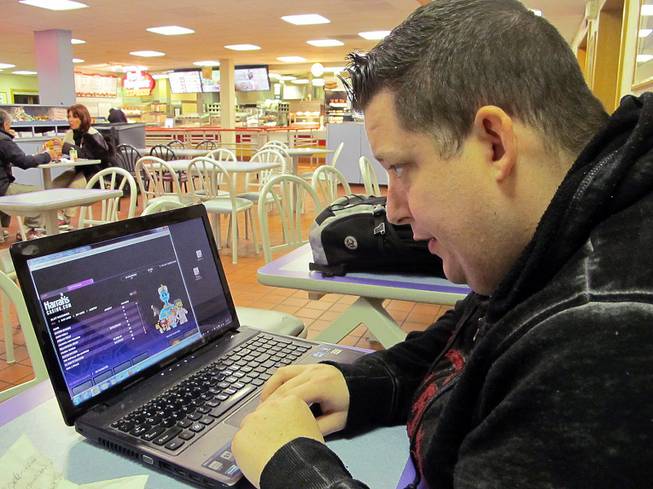
ASSOCIATED PRESS
Joseph Brennen of Ventnor, N.J., logs on to a Harrah’s online casino on his laptop from a highway rest area in Egg Harbor Township, N.J. on Thursday, Nov. 21, 2013, the first day of a test of Internet gambling in New Jersey.
Tuesday, Feb. 17, 2015 | 2 a.m.
On any given day, a team of well-suited lobbyists glides through Capitol Hill to deliver a shocking ultimatum for lawmakers: Ban online gaming, or risk Americans' financial and moral ruin.
"Click your mouse," goes one oft-used slogan by anti web-gaming advocates, "and lose your house."
The other side of the online gaming debate is made up of smaller, disparate groups who lack a similarly cohesive message.
But they need one, say some web gaming advocates who are worried that without an equally startling message to grab lawmakers' attention, they don't stand a chance against a well-organized and richly funded campaign to ban online gaming.
Ban proponents are backed by millions from Las Vegas Sands CEO Sheldon Adelson, who has promised to spend "whatever it takes" to ensure American families can't use their computers and mobile devices for online gambling, which he considers a 21st-century abomination.
Adelson's shock-and-awe messaging strategy is savvy, say online gaming advocates. Most federal lawmakers don't spend their days thinking about online gambling, so a startling line like one used by the Adelson-backed Coalition to Stop Internet Gambling on its website — "Your kid's smartphone could be a casino" — is an easy way to get in the door to make your case.
"If you walk in and say, 'Do you want to protect children and stop terrorism and money laundering?' You're going to hear a resounding, 'Yes,'" said Jan Jones Blackhurst, an executive for Caesars Entertainment, which supports online gaming as another avenue of revenue for brick-and-mortar casinos.
Pro-web gaming supporters are trying to coalesce just as the high-stakes movement to get Congress to reinstate the ban on online gaming, which was lifted by a 2011 Department of Justice decision, appears to be heating up.
Earlier this month, Rep. Jason Chaffetz, R-Utah, reintroduced a bill from last Congress to restore the federal government's ban on web gaming. The chair of the powerful House Oversight and Government Reform committee plans to hold hearings about online gambling's corrupting influence on children. The bill is expected to be introduced in the Senate by South Carolina Republican Lindsey Graham, a potential 2016 presidential contender.
It's not clear how far the legislation will move this Congress. But what is clear is that the powerful GOP donor Adelson — a man even Nevada Democratic Sen. Harry Reid calls a friend — appears determined to stop at nothing until web gaming is illegal once again.
He has money to bide his time and is making a purely moral argument to get his way.
"Whether it is full casino gaming, poker only, or anything in between—this is a societal train wreck waiting to happen," Adelson wrote in a 2013 Forbes column.
Three states — Nevada, New Jersey and Delaware — have legalized some form of online gaming, and as many as 10 others are considering doing so.
The arguments for keeping online gaming span the spectrum: It's a decision that should be left up to the states. Well-rounded studies show no correlation between online betting and the end of society. New geo-location and age-verification technology keep poker off your children's smartphones. Banning online gaming will only push it offshores and underground, expanding its potential menace.
But none of those points will resonate in Congress without a slogan that can make lawmakers listen in the first place, say analysts.
"They'll lose," predicted Georgetown University Law professor Heidi Li Feldman of online gaming supporters' chances without a bumper-sticker slogan.
The failure to build a messaging strategy is indicative of a larger problem for online gaming supporters: Their movement has no leader.
That job would typically fall to the industry's top trade group, the American Gaming Association. But the AGA has quietly stepped out of the online gaming battle — influenced, many insiders believe, by board member Adelson.
There is a pro-online gaming group, the Coalition for Consumer and Online Protection, but the organization is significantly less active than its counterpart, the Coalition to Stop Internet Gambling, which produces slick videos on the dangers of online gaming and offers resources for parents to keep their kids safe.
Individual companies like Caesars, MGM Grand and smaller lobbying organizations like Porter Gordon Silver, run by former Nevada Rep. Jon Porter, are left to strategize their next move against Adelson.
The end game may come down to who has the best slogan.
"It doesn't really matter what the merits of any given issue are," said Feldman. " … The side that gets heard will be the side that gets responded to."

Join the Discussion:
Check this out for a full explanation of our conversion to the LiveFyre commenting system and instructions on how to sign up for an account.
Full comments policy